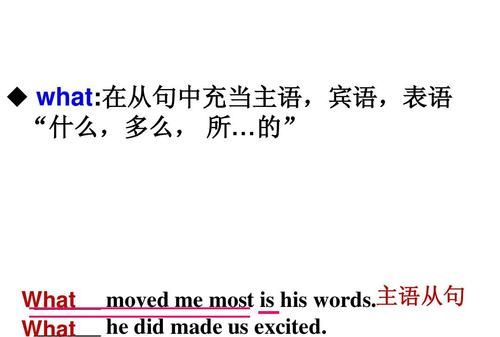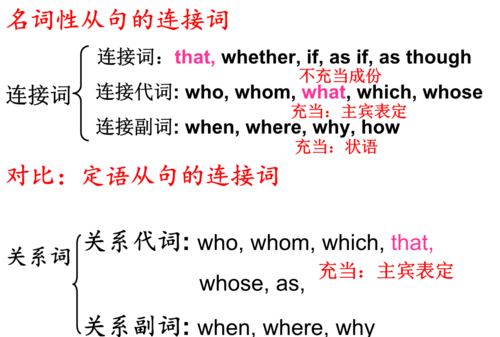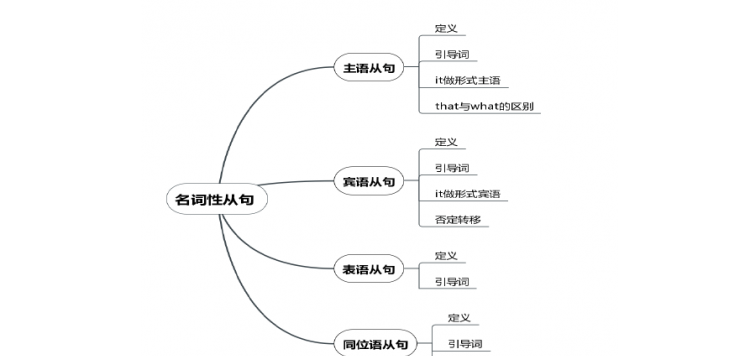本文目录
让你作文从low到高端的法宝――名词性从句
每每看着你自己那一“I” 到底,满是I can, I will的作文,再看看别人家那满是你读都读不懂的长句子作文,你是否也会有这样的感叹:“老铁,扎心了。”
别羡慕他们,真的,你已经学会了定语从句,今天再来一法宝——名词性从句,你也能变身为他眼中的奥特曼!
名词性从句概览
在复合句中起名词作用的从句叫名词性从句 (Noun Clauses)。名词从句的功能相当于名词词组, 它在复合句中能担任主语、宾语、表语、同位语、介词宾语等,因此根据它在句中不同的语法功能,名词从句又可分为:主语从句、宾语从句、表语从句和同位语从句。
1).How the book will sell depends on its author. (主语位置,主语从句)
2).John said that he was leaving for London onWednesday. (谓语动词后面,宾语从句)
3).The fact is that he has not been seen recently. (系动词后面,表语从句)
4).He will talk to us about what he saw in U.S.(介词后面,宾语从句)
5).It is impossible that I go and attend themeeting. (主语从句)
6). The fact that hehad not said anything surprised everybody. (同位语从句)
名词性从句连接词的用法
连接词:1. that; 2. whether; 3. what/where/when/which/wh-ever/
however
可使用的名词性从句: 1.主、宾、表、同; 2.主、宾、表、同; 3.主、宾、表、(同)
是否充当从句的句子成分: 1.否;2. 否;3. 是
可否省略:1.动词后宾从中可省;2.否; 3.否
可否用其他词代替1.否 ;2.动词后宾从可用it代替; 3.否
以上连接词的共同作用是:连接主句和从句(连接作用)
连接词的选用
1.that/what的选用
that 和 what都可引导所有的名词从句。但是,what除起连接作用外,还在名词性从句中_作成分_,可做从句的主语、宾语、或表语。而that在名词性从句中_不作成分_。
1).______ he wants is a book.
2). ______ he wants to go there is obvious.
3).The result is ______ we won the game.
4).This is _____ we want toknow.
5).We should pay attention to ______ the teacher is saying.
6). We are interested in the news______ some foreigners would visit our school.
2.if/whether的选用
1). I asked her __________she had a bike.
2). We’re worried about________ he is safe.
3). ________ we will hold a party in the open air tomorrow depends on the weather.
4). The question is_________ he should do it.
5). I don’t know ___________ he is well or not.
6). I don’t know _______ to go.
Summary 总结 (不能使用if 的情况):
总结:1). if只能用在动词后的宾语从句,不能用在介词后的宾语从句
2).if 不能用在主语从句中
3). if 不能用在表语从句中
4). whether or not 连在一起引导宾语从句时不用if.
5). whether to do 做动词宾语, 不能用if todo.
3.其他连接代词和连接副词的选用
主要根据名词性从句中的具体意义,正确的选择who、which、when、where、why、how 等连接词,这些连接词既具有疑问含义,又起连接作用,同时在从句中充当各种成分。
我们何时举行运动会还没有决定。________ we shall hold our sports meeting is notdecided.
我不知道昨天谁打破了玻璃。I don’t know _________ broke the glass yesterday.
我不知道他长的什么样子。I have no idea _________ he looks like.
这就是我忘记眼镜的地方。This is _________ I left my glasses.
主要考点
考点1. 语序问题
名词性从句在句中要用_陈述___语序,从句的引导词必须始终置于从句的句首。
1).No one can be sure ____ in a million years.
what will man look like B. what man will look like
C. man will look like what D. what look will man like
2).You can’t imagine ____ when they received thesenice Christmas presents.
A. how they were excited B. how excited they were
C. how excited were they D. they were how excited
考点2. 时态问题
1). He said that he will go tothe station. 改错()
2). Our physics teacher once told us that light__________ ( travel ) faster than sound.
3). Tom says that Mary ____ (go) abroad last year and _________ (be)there for nearly 5 months
总结:1)主句的动词用过去时,从句谓语动词用过去的某种时态;
2)主句的动词用过去时,从句表示客观事实,格言,谚语等,从句谓语动词用一般现在时;
3)主句的动词用一般现在时,从句谓语可根据需要选用各种时态。
考点3. 主谓一致问题
何时开会还没有决定。 When the meeting will begin _____(have) not been decided yet
他们何时出发和他们去哪里还没有决定。When they will start and where they will go______(have) been still unknown.
何时何地开会还没有决定When and where the meeting will begin _____ (have) not been decided yet.
总结:单个的主语从句作主语时,谓语动词一般用单数形式。
如果是两个或两个以上的主语从句作主语,谓语动词则用复数形式。
由两个或多个连接词引导一个主语从句,谓语动词用单数形式。
考点4. it作形式宾语和形式主语问题
1). I think_____ worthwhile that we spent so much money on these books.
2). _____ is hard to decide when and where we will held our sports meeting.
总结:当主语从句较长,而谓语较短时,常常将从句_放后_,而用it 作为形式主语置于句首。it也可作形式宾语。
高考链接
1). It iso bvious to the students ______ they should get well prepared for theirfuture.
A. as B. which C. whether D. that
2). When asked _____ they needed most, the kids said they wanted to feel important and loved.
A. what B. why C. whom D. which
写作升华
写作中,得高分的方法之一: 改造低级句型,让你的英语靓起来
原句: 1)He gave me something. 2)It was a Christmas present and a heart full oflove.
改装后:What hegave me was a heart s not only aChristmas present but also full of love
原句: 1)Some of the happiest people in the world are thosepeople.
2)Those people help to bring happiness to others. 3)Volunteersbelieve it .
改装后:1)Some of the happiest people in the world are thosewho help to bring happiness to others. .
2)Volunteers believe that some of the happiest peoplein the world are those who help to bring happiness to others.
THE KEY: 1. what, that, that,what, what, that 2. if/wheter, 其余都是whether 3. when,who, what, where
1. BB 2. will 改为would, travels, went, has been 3. has, have, has 4. it, It 高考链接: DA
怎么样,新技能get到木有,快回家试着改改你的作文吧,争取下次亮瞎老师的——(呃 ?)老眼!

英语写作各种高级从句句型总结
1.名词从句
① It would mean a great deal to me to listen to the tape and learn what is covered in the talk. ( 2004 全国卷 Ⅲ )
② My hometown is no longer what it used to be.
2.(非限制性)定语从句
① The flat is in a building on Fangcao Street. It is not far from Jianxin Chinese School.→
The flat is in a building on Fangcao Street, which is not far from Jianxin Chinese School. (NMET 2003)
② It was quite an experience for us both, which I’ll never forget for the rest of my life. (2002 北京卷)
【复合句】:定语从句、名词性从句、状语从句。
一、定语从句:
1. that,which,who的使用。一个句子当中有两个相同的名词,将其中的一个名词进行替换,如果是人,用who;如果是物,用which;that既可以指人又可以指物。
2. 谓语动词(结构)和后面的介词有两种关系:关系紧密&关系疏远;定语从句中如果谓语结构和介词关系紧密,则介词必须保留在谓语结构的后面,不能做任何位置的改动;如果谓语结构和介词关系疏远,介词一般提到which/who/that的前面; 介词加which正好表示时间,可以表达成whe- n;表示地点时,可以表达成where;表示原因时,变成why;
3. 限定性定语从句和非限定性定语从句。限定性定语从句:定语从句和关系词关系非常紧密,删掉定语从句后,整个句子意思会改变;非限定性定语从句:定语从句和关系词关系不是很紧密,删掉定语从句后,整个句子意思不会改变,定语从句只起到补充说明的意义;
eg: He won the first place in the competition, which is out of our expectation.
② 非限定性定语从句:which引导非限制性定语从句只能放在后面,as则只能放在句子前面
二、名词性从句:主语从句、宾语从句、表语从句及同谓语从句;
形式:名词+从句;
连接词取决于后面的从句是什么样的形式;
如果是陈述句,直接加that引导;
一般疑问句:先把一般疑问句变成陈述句语序,然后在其前加上weather或者if;
特殊疑问句:直接保留特殊疑问词,后面的句子变成陈述句语序;
定义:在句子中起名词作用的句子,且在句子中能担任主语、宾语、表语、同谓语、介词宾语等成分;
eg. Yuminhong, the president of New Oriental School.
三、状语从句:
两个独立的句子中间用一些含义不同的连接词连接;状语从句用来表达两个句子之间的逻辑关系;分成原因状语、条件状语、结果状语、时间状语、地点状语、让步状语、目的状语、比较状语、方式状语等九大类型;
定语从句是名词+关系词+从句,关系词的用法取决于名词的问题;
名词性从句:同谓语从句:名词+关系词+从句,关系词跟后面的从句有关系,如果是陈述句,直接加that引导;
一般疑问句:先把一般疑问句变成陈述句语序,然后在其前加上weather或者if;
特殊疑问句:直接保留特殊疑问词,后面的句子变成陈述句语序;
宾语从句:动词+关系词+从句;
表语从句:系动词+关系词+从句;
主语从句:关系词+从句+谓语动词;
状语从句:完整句子1+逻辑关系词+完整句子2;
如何区分定语从句和同谓语从句:whether,what,how接在名词后面一定是同谓语从句;关系词是when ,where,why如果前面不是时间、地点、人物,那么是同谓语从句;如果是的话,则为定语从句;如果见到which的话,which在句中翻译成“哪一个”,就是同谓语;翻译不成“哪一个”就是定语从句;that 就是看它在句中是否充当成分,如果充当成分就是定语从句;不充当成分就是同谓语从句;
Whether the plan is feasible remains to be proved. (主语从句)
是否这个计划是可行的仍然值得去考证。
I worry about whether he can pass through the crisis of his illness. (宾语从句)
我担心他是否能度过疾病的危险期。
They are investigating the question whether the man is trustworthy. (同谓语从句)
At time when hiring qualified people is becoming more difficult(定语从句),employers who can eliminate invalid bias from the process have a distinct advantage. (定语从句)
在雇佣合格人才变得越来越困难的时期,那些能够在雇佣过程中消除站不住脚的偏见的雇主具有明显的'优势。
Eg. While (让步状语从句)even the modestly educated sought an elevated tone when (时间状语从句)they put pen to paper before the 1960s, even the most well regarded writing since then has sought to capture spoken English on the page.
在20世纪60年代之前,当人们伏案写作的时候,即使那些接受教育不多的人也会追求一种高雅的风格,但是从那以后,即使是那些令人敬仰的文学作品也在追求一种口语的风格。
Eg. About 45% of the world's population lived in the climate zone where mosquito transmit disease . 全球45%的人口都生活在这样的一个区域,这个地方的蚊子会传播疾病。
Eg.He was an Asian American (who was) raised in a household where respectful zones in authority was show by averting your eyes . (定语从句) 他是一个亚裔美国人,在他生长的环境当中,避免与有权威的人对视是对对方尊重的一种表现。

在英语中什么是从句基本用法
英语从句在英语学习中起着很重要的作用,无论是在输入(如语篇分析、阅读理解等)还是在输出(如口语、写作)中一直是中国学生英语学习中的难点,下面是我整理的在英语中什么是从句,欢迎阅读。
在英语中什么是从句
从句[1] 是复句中具有分属地位的分句,它是一种绝大部分语言都有的语法结构。在现代汉语的语法中,“从句”不作为专业术语被使用。在现代英语的语法中,从句指复合句中不能独立成句,但具有主语部分和谓语部分,由that、who、whom、when、why、where、how、which等引导词(Connective)引导的非主句部分。现在中国教育的“从句”二字常指现代英语的从句结构,故以下只列出现代英语的从句使用。
一,名词性从句
1主语从句Whether it's right or not remains to be seen.
2宾语从句I wonder whether it's right or not.
3同位语从句This is a question whether it's right or not. 4表语从句The question is whether it's right or not.
二,定语从句
1限定性定语从句She is the student who can speak English well. 2非限定性定语从句She is the student,who can speak English well.
三,状语从句
1时间状语从句The fact will come out when he comes here.
2地点状语从句You can go wherever you like.
3原因状语从句Pay more attention to your lessons because you are a student. 4方式状语从句He walks as if he were a king.
5目的状语从句She went to Japan so that she could learn Japanese well. 6结果状语从句She went to Japan so that she learned Japanese well. 7条件状语从句I will understand it if he tells me.
8让步状语从句He knows a lot though he is little.
PART2:经典名词性从句
主语从句(subject clauses)在复合句中起主语作用的从句叫主语从句。引导主语从句的词有从属连词、、关系代词、连接副词等。引导主语从句的关联词有从属连词that、whether,关系代词:who, what, which , whom, whose, whatever, whoever, whomever, whichever;关系副词:when, where, how, why, however, whenever, wherever等。
That you don’t like him is none of my business.你不喜欢她不管我的事。 What he said is true. 他说的是真的。
Do you remember how he arrived almost at the end of the party? 你记得他几乎是在宴会快结束时才到的吗? This party's really where it's at, man! 啊,这个晚会真棒!
Tell us how you fulfilled the heavy task ahead of schedule.告诉我们,你们是怎样提前完成这一艰巨任务的。 We have reason to believe that the fighting on the border may develop into a full-blown war. (喻)我们有理由相信边境上的冲突可能发展成一场全面战争。
He said that he would come. 他说他要来。
Whether the football game will be played depends on the weather.足球比赛是否举行将视天气而定。
表语从句 用作表语的从句叫作表语从句,它位于主句中的连系动词之后。引导表语从句的词有从属连词that、whether、as though(if);关系代词who, what, which, whom, whose, whatever, whoever, whomever, whichever等;关系副词when, where, why, how, however, whenever, wherever等。可以接表语从句的连系动词由be, look, remain, seem等。That引导表语从句时,在口语中,间或可以省略。
The trouble is that we are short of money.困难是我们资金短缺。
That is why stone walls are used instead of fences around New England fields.这就是为什么在新英格兰用石头墙而不用栅栏的原因。
At that time, it seemed as if I couldn't think of the right word anyhow.当时,我似乎怎么也想不出一个恰当的字眼来。
宾语从句(object clauses)用作宾语的从句叫做宾语从句。宾语从句的位置与陈述句基本结构中的宾语相同。宾语从句可作谓语动词的宾语,也可以作介词和非谓语动词(动词不定式、动名词、分词)和某些形容词的宾语。宾语从句可以由从属连词that whether、if,关系代词what, who, whose, which和关系副词when、where、how、why等引导。
He said he wanted to go to town. 他说他想去城里。
I hope you'll be better soon.我希望你能很快好起来。
I’m so glad that you were able to come to this party.你能设法抽空出席这个交际会,我很高兴。
I know nothing about it except what I have read in the papers.除了在报上读到的以外,我对这件事一无所知。
Most of the Chinese people usually go to work on the bike except when it rains.除了雨天,大多数中国人一般都骑自行车上班。
He asked me whether she was coming. 他问我,她来还是不来。
同位语从句 用作同位语的从句叫同位语从句。它一般跟在抽象名词fact,idea,news,hope,belief,thought,truth,doubt,suggestion,warning, instruction,reason,information, question等之后,对这些名词进行说明或解释。引导同位语从句的词除连词that,whether外,还有关系代词what, which, who, 以及关系副词how,when,where,why等。
It is a fact that smoking is a danger to health. 吸烟危害健康,这是事实。
I have no idea what you mean.我一点儿也不明白你的意思。
He made the suggestion that we go by train. 他建议我们坐火车去。 There is no doubt that he is guilty. 毫无疑问,他是有罪的。
PART3:经典定语从句
1.窗户朝南的那间房间是我的。
The room whose window faces south is mine.=The room of which the window faces south is mine.
1. 整座城市躺在废墟中,其中百分子75的工厂和大楼消失不见了。 The whole city, 75% of whose factories and buildings were gone, lay in ruins.
2. 我们公司有2000工人,三分之二是女工。
Our company has 2000 workers, of whom two thirds/ two thirds of whom are women.
3. 那些被困在废墟里的人已经得救了。
Those who were trapped under the ruins finally got rescued.
4. 你们刚才谈论的那场地震好可怕呀!
The earthquake that you were talking about sounded frightening/shocking.=The earthquake about which you were talking sounded frightening.
5. 我的家人都是音乐爱好者,今晚将去看电影。
My family, all of whom are music lovers, are going to the movie tonight.
6. 我们正在看的这幢大楼过去曾经是一家医院。
The building which we are looking at used to be a hospital.
7. 约翰向母亲说起过把他在国外见过的人和城市。
John once talked to his mom about the people and cities that he had visited abroad.
8. 他是去过伦敦的一位以观光者之一。
He is one of the tourists who have been to London.
9. 他是这些观光者当中唯一去过伦敦的。
He is the only one of the visitors that/who has been to London.
10. 这就是你们上个礼拜参观过的学校吗?
Is this the school that you visited last Sunday?
11. 这所学校就是你们上个礼拜参观过的那所吗?
Is this school the one that you visited last Sunday?
12. 他们曾经居住过的是在这个地方里。
It is in this place that he once lived.
13. 这是他们曾经住过的地址。
It is the place where he once lived.
14. 他有两个儿子,每一位都看起来像他。
He has two sons, either of whom looks like him.
15. 他有连个儿子,并且每一个都看起来像他。
He has two sons, and either of them looks like him.
16. 这是一本封面是蓝色的书。
17. This is a book whose cover is blue.=This is a book,of which the cover is blue=This is a book,the cover of which is blue.
18. 他不说令她生气的话。He said nothing that made her angry.
19. 那就是他拒绝在会上发言的理由。That was the reason why/for which he refused to speak at the meeting. =That was the reason which/that he refused to speak for at the meeting.
20. 那就是前几天麦克给我的理由。
That was the reason that/which Mac gave me.
21. 正如我们大家都知道的一样,比尔盖茨创建了微软公司。
As is known to us all, Bill Gates founded Microsoft on his own.
22. 比尔盖茨创建了微软公司是我们大家都知道的。
It is known to us all that Bill Gates founded Microsoft on his own.=That Bill Gates founded his own Microsoft is known to us all.
23. 是他那夹杂着乡村音乐,布鲁斯音乐和福音的风格成就了他的名气。你是同谁一起去看的电影?
It is his voice, with his country, blues and Gospel styles, that made him famous. Who was it that you went to the movie together with?=With whom was it that you went to the movie together..
24. 他不像是那种把工作留下一半的那种人。
He isn’t such a man as would leave his work half done.
25. 我要用与你们工厂里用过相同的那种工具。
I prefer to use the same tools as were used in your factory.
26. 我丢了一本书,书名我一时记不起来了。
I have lost a book whose title escapes me at the moment.=I lost a book,of which the title escapes me at the moment.
27. 像你在读的那本小说我不欣赏。
I don’t enjoy such a book as you are reading.=I don’t appreciate the same book as you are reading.
28. 擦黑板的那一位应该受到表扬
The one who cleans the blackboard should be praised.。
29. 我在初中度过的那三年我永远不会忘记。
I will never forget the three years that I spent in the junior middle school
30. 那不是我做事情的方法。
That isn’t the way( in which/that) I do it.
31. 他们能用不同的方法拼写单词,这是你们发现有趣的方法。
They could spell words in different ways which/that you might find interesting.=They could spell words by different means that /which you might find interesting.
32. 照现在的样子抄写这个表达词语,不要有任何更改。
Copy this expression as it is; don’t make any change.
33. 我们将尝试着帮助家长改善他们与孩子交谈的方式。
We will try to help parents improve the ways (that/in which) they talk with their children.
34. 只有用这种方法才会停止比尔盖茨的快速成功。
Only in this way/by this means can Bill Gates’ quick success be stopped.=Only in this way/By this means can they stop Bill Gate‘s quick success。
35. 这位在救援中左脚受伤的士兵,年仅二十岁。、
The soldier whose left foot got wounded during the rescue is only twenty years old.
36. 他们破坏法律的方式开始的时候是和平的。
At first the ways that/in which they broke the laws were peaceful.
PART4: 经典状语从句
1.条件状语从句:
1) 除非,若不;相当于if---not) 即:If you are too tired,we’ll not go out for a walk.
2)只要,表示条件的唯一性)
3)(以防---,以免---)
4)条件是---)
5) 如果,假如)
6)He won't be against us in the meeting that we ask for his advice in advance.( 假如,除非以……为条件)
7)一旦---就--)
2.时间状语从句:
1)当---的时候,表示“瞬时动词”)
2当---的时候,was reading是延续性的动词,was reading和was watching同时发生)
3)(然而,表示“对比”)
4)(as强调句中两个动作紧接着先后发生,而不强调开始下雪的特定时间)
5)(as表示“一边……一边”)
6)Einstein almost knocked me down he saw me.(“在---之前”或“----才”)
7)(“刚好在---之前”或“---就”)
8)(在---之后)
9)“直到----才”,主句中的动词为非延续性动词)
10)“直到----才”,主句中的动词为延续性动词) 自从---)
12) I will go there I have finished my breakfast. (一----就---,另外有immediately, instantly)
I heard the news, I hastened to the spot. (一----就---,另外有the instant, the minute,ect.) 一----就---)
15) He had arrived home he was asked to start on another journey. (一----就---,另外有hardly/scarcely----when---)
16) you came back, I had finished this book.(“到---时为止”,从句是一般过去时,主句是过去完成时。)
you come here tomorrow, I will have finished this work. (“到---时为止”,从句是一般现在时,主句是将来完成时。)
“每当---的时候”或“每次”,复习each time, every time和whenever)
3.有关时间状语从句的重点句型
1)过很久才----)
2)come back.( It won’t be---before---不久就---)
2)meeting was over he began to teach me English.(“ It was not until---that----” not until的强调句型)
3)的倒装句型。) 我们老板离开北京有五个月了。(“It is/has been---since” 自从---以来多长时间)
had I sat down he stepped in.我刚坐下,他就进来了。(“hardly/scarcely----when---”/同“no sooner ---than” 注意时态的应用。)
4.原因状语从句
1)The sweater shrank it was washed badly. (强调“直接原因”)
we’ve no money, we can’t buy it. (由于)
you are free today, you had better help me with my mathematics. (“既然”强调双方共知的原因,复习 “now (that),seeing (that), considering (that), in that”)
4)引导的原因状语从句并不说明主句行为发生的直接原因, 只提供一些辅助性的补充说明, for引导的原因状语从句只能放于主句之后并且必须用逗号将其与主句隔开。)
5)国强不在大。(“not ... because”结构中的not否定的是because引导的整个从句)
5结果状语从句
1)太---以至于) 太---以致于) (以致于)
4) 注意状语从句与too….to..enough to…, so… as to结构的不同。
6.目的状语从句
1)You must speak you can be heard by all.( 为了;以便)
2)He wrote the name down (生怕,以免)he should forget it.
3)以免)the weather is cold.
4) Say it louder(so)that everyone can hear you.( 以便)
7.让步状语从句
1)虽然,纵然,尽管) you may, I’ll go.( 虽然,纵然,尽管) 虽然,纵然,尽管) 虽然,纵然,尽管)
5) We’ll make a trip “即使……”) (“不论是否……”,“不管是……还是……”)
you are, you must keep the you are, you must keep the law.(无论谁,复习no matter +疑问词引导的状语从句。)
8)(尽管)
8.方式状语从句
1)minds.
2)3)说明:as if / as though也可以引导一个分词短语、不定式短语或无动词短语,例如:He stared at me as if seeing me for the first time.(他目不转睛地看着我,就像第一次看见我似的。)
He cleared his throat 么似的。)
The waves dashed on the rocks 很愤怒。)
4)Please pronounce the word do.(用---方式)
5)Leave the things they are.(按照---)
9.比较状语从句
1)You seem to know music you know astronomy.(as---as 结构)
2)There his in this city. (no so---as 结构)
3)There were not so many tickets available as were asked for. (not so---as 结构)
4)Finally he has he wanted. (as +adj +n.+as 结构)
5)Your watch is not his.(the same as结构)
6)I never met a man your younger brother.(such---as 结构)
7)She studies her classmates.(more than结构)
8)other book has had on my life.(否定词和比较级连用表示最高级含义。)
9)This teacher explained the problem more clearly than (比较级与 “any other one”连用表示最高级含义。)
10)The more you read, the better will you write.(the more----the more 结构)
11) He earned 800 dollars a month. 他一个月只挣800美元。(no +比较级+than结构).
10.地点状语从句
1)there is a will, there is a way.
2)You should have put the book you found it.
3) there is smoke , there is fire.
4) When you read the book, you’d better make a mark you have any questions.

英语写作必会的十种高分句式有哪些
英语写作必会的十种高分句式
导语:英语的句式有很多种,其中有十种是英语写作中必须要学会的,下面我向大家介绍英语写作必会的.十种高分句式,欢迎参考!

一、改变时态
例:The bell is ringing now. 一般
There goes the bell.特殊
二、改变语态
例: People suggest that the conference be put off.一般
It is suggested that the conference be put off.特殊
三、使用不定式
例: He is so kind that he can help me.一般
He is so kind as to help me. 特殊
四、使用过去分词
例: 1 She walked out of the lab and many students followed her.一般
Followed by many students, she walked out of the lab.特殊
2 Once it is seen, it can never be forgotten.一般
Once seen, it can never be forgotten. 特殊
五、使用 v- ing
1 When he arrives,please give me an e-mail.一般
On arriving /his arrival ,please give me an e-mail.特殊
2 If the weather permits ,I will come tomorrow.一般
I will come tomorrow, weather permitting. .特殊
六、使用名词性从句
1.It disappointed everybody that
he didn't turn up.一般
The fact that he did n' t turn up
disappointed everybody.特殊
2.I happened to have met him.一般
It happened that I had met him. 特殊
3.To his surprise, the little girl knows so many things.一般
What surprises him is that the little girl knows so many things. 特殊
七、使用定语从句
例; The girl is spoken highly of. Her composition was well written.一般
The girl whose composition was well written is spoken highly of. 特殊
八、使用状语从句
1.I won't believe what he says.一般
No matter what he says, I won't believe.特殊
2.If you come back before six o'clock, you can go out.一般
You can go out on condition that you come back before six o'clock. 特殊
3 If she doesn't agree, what shall we do? 一般
Supposing that she doesn't agree, what shell we do ?特殊
九、使用虚拟语气
例: The ship didn't sink with all on board because there were the efforts of the captain.一般
But for the efforts of the captain ,the ship would have sunk with all on board.特殊
十、使用倒装句型
例:Though I'm weak I'll make the effort.一般
Weak as I am, I'll make the effort.特殊
;以上就是关于英语写作名词性从句,让你作文从low到高端的法宝――名词性从句的全部内容,以及英语写作名词性从句 的相关内容,希望能够帮到您。
